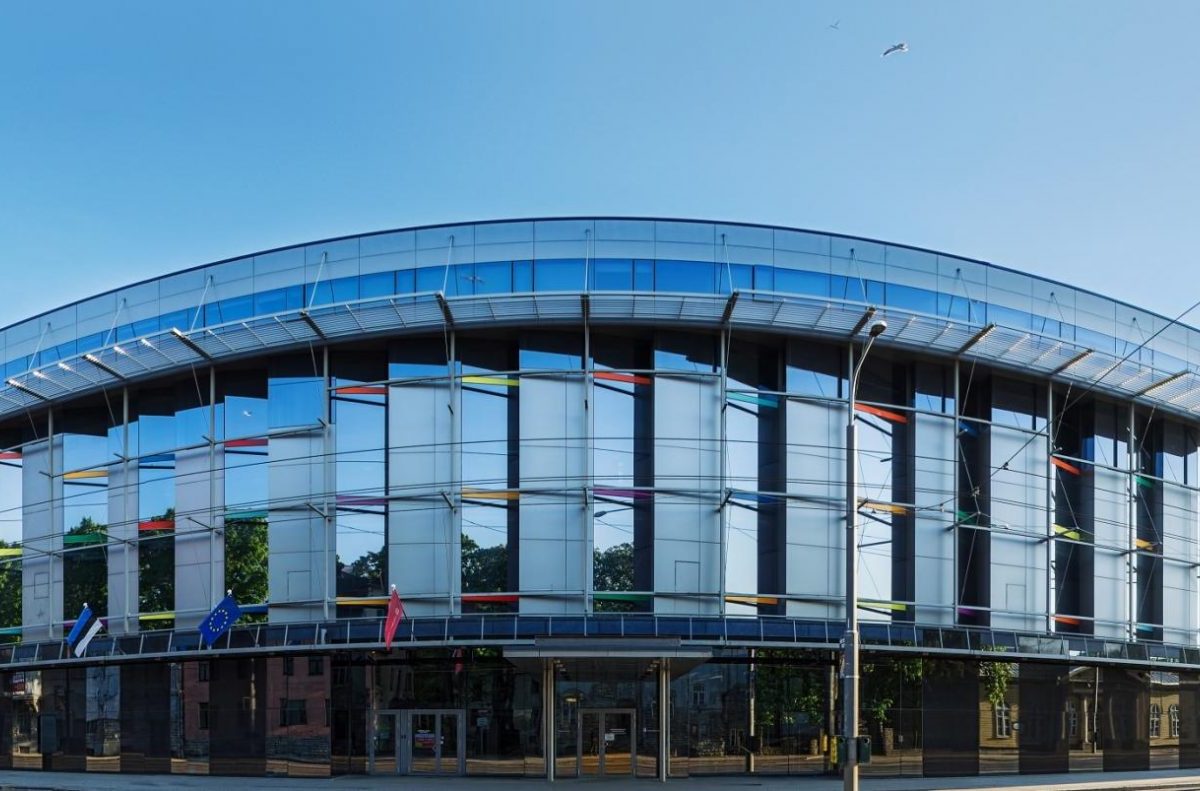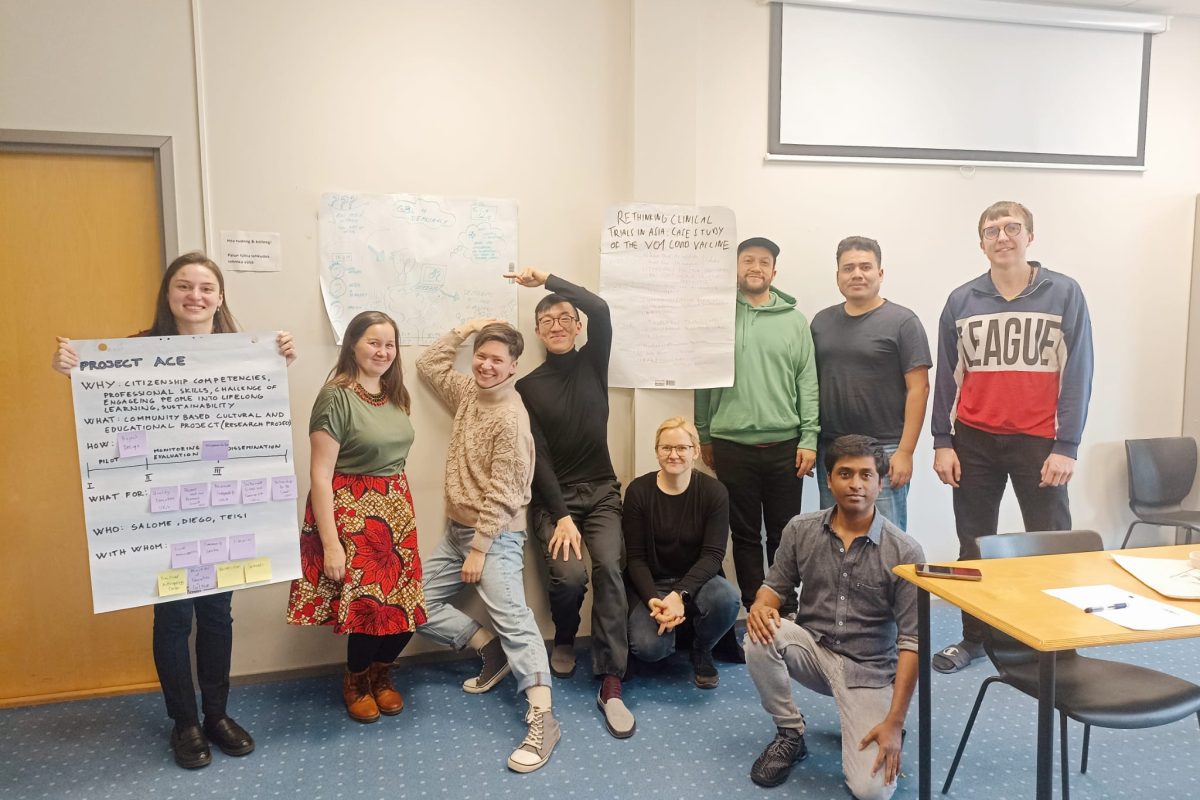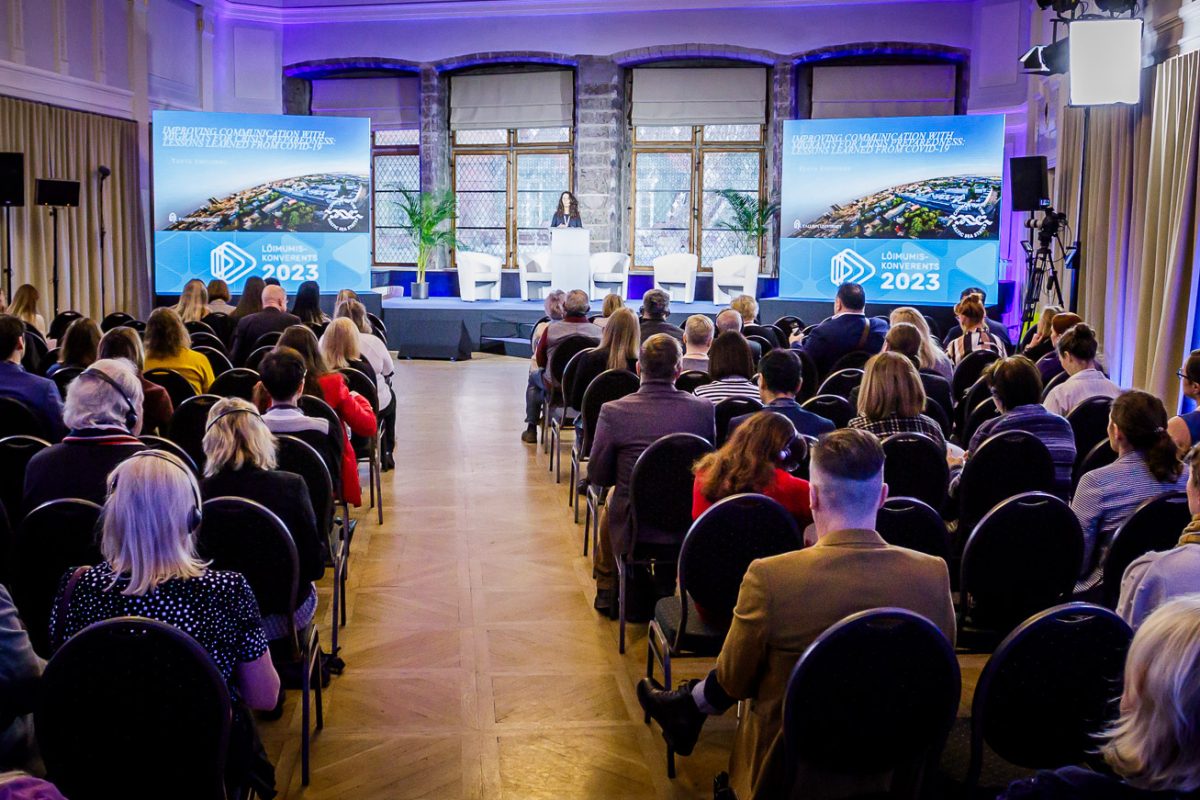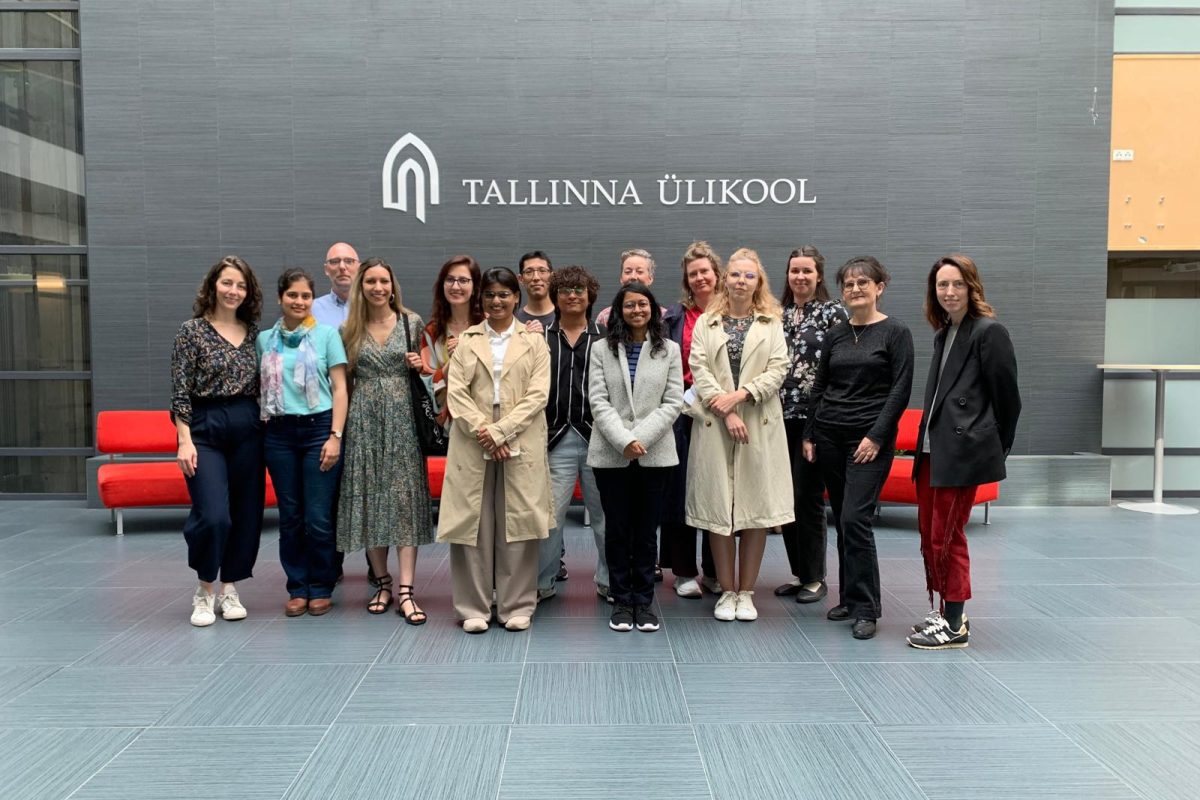Tanya Escudero is a Postdoctoral Researcher at the School of Humanities, where she just started her Mobilitas Pluss postdoctoral research project under the supervision of Prof Daniele Monticelli. Over the next two years she will study the ideological impact of news translation on the migration discourse in Spanish and Mexican media.
Course on Entrepreneurial Mindset for Junior Researchers
In the constantly evolving landscape of academic research, it is becoming more and more evident how important entrepreneurial skills – such as effective communication, team management and environmental scanning – are for researchers. In response to this need, Tallinn University has introduced a new course entitled “Entrepreneurial Mindset for Junior Researchers” as part of the C-Accelerate project, curated and delivered by Tanya Escudero and Ulrike Rohn.
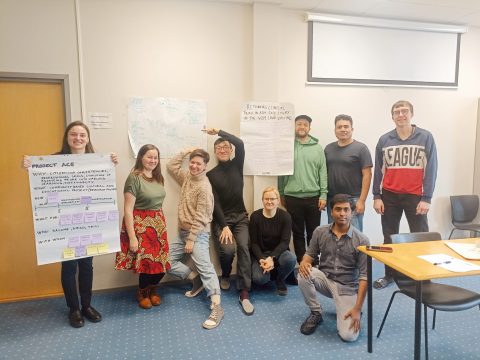
Course participants at TLU
Aimed at PhD students from a variety of disciplines, the course was designed to nurture an entrepreneurial mindset that would enable them to successfully navigate both academic and real-world challenges. The objectives of the course were threefold: firstly, to introduce junior researchers to entrepreneurial thinking; secondly, to guide participants in exploring their inner strengths and domain expertise for impactful contributions within and beyond academia; and thirdly, to encourage interdisciplinary interactions, collaborations and network development.
The timing for developing this course was particularly good. From September 2024, the PhD curriculum at Tallinn University will include a centrally delivered module on transferable skills across all schools and disciplines (offering short practical courses and workshops of 1-2 credits). By piloting this course in the spring semester of 2024, it has been possible to fully integrate it into the upcoming curriculum.
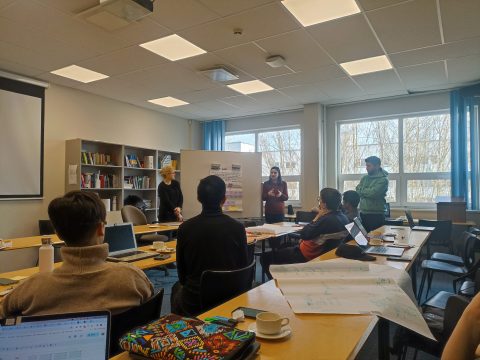
The course was structured into six two-hour sessions, most of which took place on consecutive weeks. Both lecturers were present at each session to encourage dialogue and create a dynamic environment. Students were asked to keep a self-reflective journal: each week, they responded to a question related to that session’s topic, which then served as the basis for further reflection in subsequent sessions.
Session 1: Theoretical Foundations
This first session served as an introduction to the course and key entrepreneurial concepts and terminology. Students applied entrepreneurial thinking to research contexts and engaged in discussions to deepen their understanding.
Session 2: Discovering the entrepreneurial self
With a focus on self-discovery, this session explored personality archetypes, inner strengths, resilience and values. An in-class self-reflection exercise encouraged students to identify their strengths, weaknesses and skills.
Session 3: Domain expertise
Students looked at their specific domains of knowledge and identified how their expertise fits within the framework of entrepreneurial competence. The session included activities to map domains and link personal strengths to domain expertise.
Session 4: Building your network
This session covered the basics of networking, including understanding different network roles such as collaborators, mentors and stakeholders. Students practised identifying their current and ideal networks to support their research projects and future endeavours.
Session 5: Impact on society
Participants considered how to integrate societal factors into their work, identifying strategies to increase their impact. The group exercise involved creating an impact canvas outline a project idea which combined their strenghts, knowledge, and networks and could potentially have a societal impact.
Session 6: Presentation and Wrap-up
The final session was dedicated to refining the impact canvas, presenting ideas and reflecting on the course. Feedback was collected to assess the outcomes of the course and to plan future iterations.
More information about the course and the feedback received at Tallinn University’s website.
About the trainers:
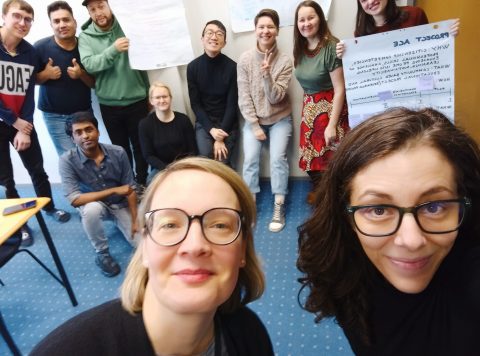
Tanya Escudero is a Research Fellow at the School of Humanities, working on topics related to communication with migrants and linguistic minorities. She is also Senior Adviser of Doctoral Studies at Tallinn University. She has curated, delivered and organized numerous trainings at TLU focusing on practical and transferable skills for PhD students. She is currently curating the new module on transferable skills at Tallinn University which will be implemented for the first time in 2024.
Ulrike Rohn is Professor of Media Management and Media Economics at the Baltic, Film, Media and Arts School (BFM). She is the co-Head of the Tallinn University Centre of Excellence in Media Innovation and Digital Culture (MEDIT), President of the European Media Management Association (emma), co-Editor of the Journal of Media Business Studies. Ulrike leads and is part of various research projects, including projects on entrepreneurship and media management.
Invited speaker at the 2023 Integration Foundation Conference (Tallinn, Estonia)
The Integration Conference “From Security to Solidarity: Challenges of Integration in the Times of Crisis” took place in November 2023. The event proposed an in-depth exploration of integration-themed topics, providing a platform for discussions and best practices exchange, drawing from narratives both within and outside Europe. The Integration Conference is designed for experts in the field of integration, policymakers, scholars, but also enthusiasts, practitioners, representatives from the third sector and the general public.
The conference opened with an overview of the results of the project “Improving Communication with Migrants for Crisis Preparedness” led by Tanya Escudero, that served as a transition to move from the covid crisis to the current war crisis.
More about the Integration Conference and agenda here.
Abstract: The project “Improving Communication with Migrants for Crisis Preparedness: Lessons Learned From COVID-19”, which was carried out by researchers in Estonia, Finland and Latvia, sought to map obstacles in communicating with communities with low command of the official language and identify good practices that could be implemented in future emergencies.
The results show that, in addition to the underlying distrust of state institutions among the population, there have been several obstacles that have further aggravated the situation and perhaps put society at risk, including insufficient information available in non-official languages or the slow provision of this information; conflicting or confusing messages from official sources; the viral spread of misinformation in different spheres, such as social media; a lack of cooperation between governments and other stakeholders; and monolithic strategies that are not adapted to the needs and concerns of specific communities, such as the approach adopted during the vaccination campaign.
The resulting reports are available for open access here.
Migration Discourse in Translated News at EST22Oslo
Tanya Escudero will present at the 10th Congress of the European Society for Translation Studies (June 2022, Oslo) a paper entitled “The translation of migration discourse in political speech in Spain and Mexico. How does the migratory landscape impact translation strategies?”. This study is part of the project Ideology in translation. Political discourse on migration in the media, funded by the Estonian Research Council.
This presentation will be part of the panel “Interdisciplinarity and interaction: moving forward with journalistic translation research in the 21st Century”, convened by Denise Filmer and Roberto Valdeon. The aim of this panel is to highlight journalistic translation research that delves into innovative and unchartered areas, such as sociological approaches to journalistic translation, ethnographic studies on news production, audience and reception studies or the use of machine translation in news translation.
The translation of political discourse on migration in Spain and Mexico. How does the migratory landscape impact translation strategies?
This paper studies the semantic shifts taking place during the translation process in translated news about migration, particularly the migration discourse coming from political domains, as political discourse shapes to a great extent the public opinion. For this purpose, I analyse the strategies used by the journalist/translator to transfer the political discourse about migration considering two Spanish-speaking countries, Spain and Mexico, which are characterised by having in recent times either immigrant or emigrant populations.
I will do so by applying critical discourse analysis from a translation studies perspective to a corpus of news published by eight online newspapers in Spain and Mexico during the last quarter of 2020 (coinciding with the presidential elections in the United States and the completion of Brexit with the ending of the transition period). The comparison between the two countries and the translation strategies used will allow to identify whether their different realities regarding the migrant process is an influential factor in the way they mediate in this migration discourse.
MSCA Postdoctoral Training 2025 at Tallinn University
At the end of March 2025, we closed our call for expressions of interest to apply to the Marie Skłodowska-Curie Postdoctoral Fellowships (MSCA PF) with the School of Humanities at Tallinn University as host institution. We were thrilled to receive over 70 proposals from researchers across the world—each with impressive profiles and fascinating project ideas who wanted to participate in this MSCA postdoctoral training.
MSCA Fellowship proposal preparation and support
Due to the high number of strong applications and the limited number of places available for onsite training, this year we decided to offer two tracks of MSCA training:
-
An onsite training camp in Tallinn with 13 selected candidates
-
A shorter online training for 10 additional candidates
Both groups are now actively working on their proposals, receiving support through feedback on multiple drafts, guidance on structure and content, and ongoing consultation with supervisors and trainers.
Disciplines and backgrounds of MSCA training participants
Participants came from a wide range of disciplines within the humanities and social sciences, including philosophy, cultural studies, history, media, and linguistics. Their diverse academic backgrounds, experiences, and perspectives brought incredible energy and richness to the group work and discussions.
MSCA training impact at Tallinn University
Thanks to the success of this initiative in previous years, other schools at Tallinn University have now adopted similar MSCA postdoctoral training programmes. Since we began running these sessions, the School of Humanities has already welcomed 5 MSCA postdoctoral fellows and 4 researchers funded through ETAg’s postdoctoral scheme—a result we’re proud of, and one that shows how targeted support can make a difference.
Feedback from MSCA Postdoctoral Fellowship training participants
The feedback from this year’s training was very encouraging. Here are just a few excerpts from what participants shared:
“Attending the MSCA Postdoctoral Fellowship training at TLU was incredibly valuable for me. I genuinely don’t think I would have been able to approach the application process with the same clarity and confidence without this workshop.”
“The trainers did an excellent job transitioning from evaluator feedback to concrete proposals, and from the proposal requirements to specific, practical examples.”
“It was highly practical, meticulously planned, and comprehensively covered all the nuances of MSCA applications… I feel encouraged and empowered to apply.”
“I especially appreciated how practical and focused the training was—it really helped me understand what’s expected in a strong MSCA application.”
“The atmosphere was warm and supportive. I now feel much more equipped to move forward with the submission.”
We’re now entering the drafting phase—working closely with each candidate to polish their proposals and make them as strong as possible. We hope to see some of them return to Tallinn as postdoctoral researchers in 2026!
It has been a real pleasure to coordinate this training once again. When I first launched this initiative at the School of Humanities, I didn’t quite imagine how far it would go. It’s been a fantastic—if at times arduous—adventure, and deeply rewarding to support early-career researchers through this process. Even more so, it’s a joy to welcome them not just as participants, but as future colleagues.
Translation policies and multilingual communication at EST22Oslo
Researchers Simo Mättää (University of Helsinki) and Tanya Escudero (Tallinn University), members of the project Improving communication with migrants for crisis preparedness, together with Shuang Li (Shanghai International Studies University) will convene a panel at the next congress of the European Society for Translation Studies focusing on translation policies in multilingual settings. Reine Meylaerts (KU Leuven) and Mustapha Taibi (Western Sydney University) will act as discussants in this panel.
The 10th EST22 Congress will take place between June 22, 2022, and June 25, 2022, in Oslo (University of Oslo and OsloMet), Norway.
The COVID-19 pandemic has proven the importance of providing information reaching all members of multilingual societies, both in cities characterized by super-diversity and in less densely populated rural areas. However, the high rates of COVID-19 cases in migrant and minority populations show that many multilingual communication strategies have not been successful. This brings to the fore the topics of community translation, as well as the potential of translation policies and practices in achieving trust relationships and influencing changes in behaviour.
A burgeoning interest in the connection between translation policy and theories provides insights that benefit Translation Studies, and the examination of the intersections among theories, policies and practices needs continued attention. Such analyses could advance Translation Studies by taking into account insights from super-diverse and multilingual settings where translation forms part of everyday life (Inghilleri 2017). At the same time, they could help develop better policies and practices for community and public service translation on local, regional, and national levels.
This panel will include theoretical and methodological contributions and case studies addressing the intersections among the policies, theories, and practices of translation in multilingual settings, including the languages of migration and regional or minority languages. Some of the topics included will address:
- Guidelines for effective translation policies
- Production and itinerary of translated, interpreted and subtitled information
- Professional and non-professional translation practices
- Translation and inclusive urbanization
- Intersections between public-service translation and interpreting
- Theoretical, methodological, and ethical reflections on the creation and evolution of translation policies and practices
- Rethinking traditional binary oppositions, such as source/target, majority/minority, monolingual/multilingual, local/global, centre/periphery, urban/rural, trust/distrust, and agency/structure through the lens of translation policies
- Methodological and theoretical tools offered by adjacent disciplines (such as sociolinguistics, anthropology, sociology, political science, public policy, and legal studies).

